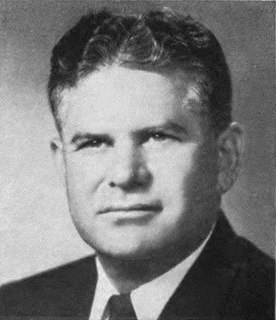Multiple chemical sensitivity (MCS), also known as idiopathic environmental intolerances (IEI), is an unrecognized controversial diagnosis characterized by chronic symptoms attributed to exposure to low levels of commonly used chemicals. Symptoms are typically vague and non-specific. They may include fatigue, headaches, nausea, and dizziness.

Jefferson Bingham Miller is an American politician who served as the U.S. Representative for Florida's 1st congressional district, from 2001 to 2017. He is a member of the Republican Party. The district includes all of Escambia, Santa Rosa, Okaloosa, Walton, Holmes, and Washington Counties.

Donald Wayne Riegle Jr. is an American politician, author and businessman from Michigan. He served for five terms as a Representative and for three terms as a Senator in the U.S. Congress.

Alice Costandina "Dina" Titus is an American politician who has been the United States Representative for Nevada's 1st congressional district since 2013. She served as U.S. Representative for Nevada's 3rd congressional district from 2009 to 2011, when she was defeated by Joe Heck. Titus is a member of the Democratic Party. She served in the Nevada Senate and was its minority leader from 1993 to 2009. Before her election to Congress, Titus was a professor of political science at the University of Nevada, Las Vegas (UNLV), where she taught American and Nevada government for 30 years.
Theron Grant Randolph was a physician, allergist, and researcher from the United States. He studied food allergies, chemical sensitivities, and preventive care. Randolph, along with other American allergists, objected to the definition of allergies as arising from serological abnormalities; this definition, common among European allergists of Randolph's day, excluded from consideration the kinds of adverse environmental reactions that Randolph studied. Randolph authored four books and over 300 medical articles and is considered the "Father of Clinical Ecology". According to his obituary in the New York Times, "traditional medical bodies ... which contended there was no scientific basis for his approach, are sharply skeptical of Dr. Randolph's unorthodox therapies". The obituary then goes on to note a, "small but discernible shift in attitude toward the issue of chemical sensitivity. In 1991, a workshop of the National Academy of Sciences agreed on a definition, designating as a syndrome cases in which patients react to chemicals at levels far lower than what is normally tolerated."

Olin Earl "Tiger" Teague was a notable World War II veteran and congressional representative for Texas's 6th congressional district for 32 years, from 1946 to 1978. He is buried in Arlington National Cemetery.

Ann Leila Kirkpatrick is an American politician serving as the U.S. Representative from Arizona's 2nd congressional district since 2019. A member of the Democratic Party, she previously represented Arizona's 1st congressional district from 2009 to 2011 and again from 2013 to 2017. She is also a former member of the Arizona House of Representatives (2005–2007).
The United States Veterans' Affairs Subcommittee on Health is one of the four subcommittees within the House Veterans' Affairs Committee. The Subcommittee on Health has legislative and oversight jurisdiction for the Department of Veterans Affairs’ health care system, programs and research apparatus.

Michael Harold Coffman is an American politician, businessman, and retired veteran of the U.S. Army and U.S. Marine Corps currently serving as the Mayor of Aurora, Colorado. A Republican, Coffman has spent over 30 years in public office in Colorado. He served as the U.S. representative for Colorado's 6th congressional district for five terms, and in the posts of Secretary of State of Colorado and Colorado State Treasurer.

Gulf War syndrome or Gulf War illness is a chronic and multi-symptomatic disorder affecting returning military veterans of the 1990–1991 Persian Gulf War. A wide range of acute and chronic symptoms have been linked to it, including fatigue, muscle pain, cognitive problems, insomnia, rashes and diarrhea. Approximately 250,000 of the 697,000 U.S. veterans who served in the 1991 Gulf War are afflicted with enduring chronic multi-symptom illness, a condition with serious consequences.

A burn pit refers to an area of a deployed military base devoted to open-air combustion of waste. The phrase "burn pit" gained notoriety in the 21st century, especially in U.S. military sites in Iraq and Afghanistan. However, this practice was used well before the War on Terror. Proper waste management practices have reduced the spread of infectious diseases that contributed significantly to mortality and morbidity in military populations in based conflicts. According to the US Army field manual, there are four other ways, outside of burn pits, to dispose of nonhazardous solid waste: incinerators, burial, landfills, and tactical burial. Using open-air burning significantly reduces waste, but increases risk of fire and produces noxious fumes. Due to modern waste in deployed environments, there is plastic, shipping materials, electronic waste, and other material that may emit toxic aerial compounds. Burn pits were heavily criticized and resulted in lawsuit by veterans, Department of Defense Civilians, and military contractors. Global environmental consciousness has especially criticized these instances of large-scale burn pit operation. The effects of burn pits seem to be similar to that of fire debris cleanup.

H.R. 2189 is a bill creating a task force in the United States Department of Veterans Affairs that would be responsible for evaluating the backlog of veterans' disability claims. The task force would look at the current method of processing them, the appeals process, and related laws and regulations, then make their own recommendations on how to improve the process. The Secretary of Veterans Affairs would be required to either implement all or some of their recommendations and justify any not implemented to Congress. The bill was introduced into the United States House of Representatives during the 113th United States Congress.

The Veterans Paralympic Act of 2013 is a bill that would help fund United States participation in the Paralympic Games. The United States Department of Veterans Affairs would be authorized $2 million a year to help pay for disabled veterans to train for the games. And additional $8 million would be authorized as a grant to U.S. Paralympics, Inc. The bill was introduced into the United States House of Representatives during the 113th United States Congress.

The Military Construction and Veterans Affairs and Related Agencies Appropriations Act, 2015 is a bill that would make appropriations for fiscal year 2015 for military construction and the United States Department of Veterans Affairs. The bill is considered one of the two easiest appropriations bills to pass each year. The total amount appropriated by the introduced version of the bill is $71.5 billion, approximately $1.8 billion less than fiscal year 2014 due to a decrease in the need for military construction.

The Department of Veterans Affairs Management Accountability Act of 2014 is a bill that would give the United States Secretary of Veterans Affairs the authority to remove or demote any individual from the Senior Executive Service upon determining that such individual's performance warrants removal or demotion. The bill was written in response to a scandal indicating that some VA hospitals were keeping secret waiting lists for care, the length of which may have led to the deaths of some veterans.

H.R. 2527 is a bill that would extend a United States Department of Veterans Affairs (VA) program of counseling and care and services for veterans for sexual trauma that occurred during active duty or active duty for training to veterans who experienced such trauma during inactive duty training. The bill would alter current law, which allows access to such counseling only to active duty members of the military, so that members of the Reserves and National Guard would be eligible.

The bill H.R. 2942 is a bill that would reestablish the Professional Certification and Licensure Advisory Committee of the United States Department of Veterans Affairs which had previously ended in 2009. The Committee was involved in making recommendations regarding matching military certifications and equivalent civilian certifications so that veterans can smoothly shift into civilian life.

The Demanding Accountability for Veterans Act of 2013 is a bill that would require the Inspector General (IG) of the United States Department of Veterans Affairs (VA) to take additional action if the VA has not appropriately responded to an IG report that recommends actions to be taken by the Secretary of Veterans Affairs to address a VA public health or safety issue. The Secretary would be required to act swiftly on such IG reports, with the bill specifying actions to take. The Secretary would also be forbidden from giving any bonuses to managers with unresolved issues.

The Veterans' Access to Care through Choice, Accountability, and Transparency Act of 2014, also known as the Veterans Choice Act, is a United States public law that is intended to address the ongoing Veterans Health Administration scandal of 2014. The law expanded the number of options veterans have for receiving care and granted the United States Secretary of Veterans Affairs more power to fire senior executives. The Veterans Health Administration scandal of 2014 began with the discovery that there was on-going systematic lying by the Veterans Health Administration about the wait times veterans experienced waiting to be seen by doctors. By June 5, 2014, Veterans Affairs internal investigations had identified a total of 35 veterans who had died while waiting for care in the Phoenix VHA system. Another audit determined that "more than 57,000 veterans waited at least 90 days to see a doctor, while another 63,000 over the last decade never received an initial appointment."
Garth L. Nicolson is an American biochemist who made a landmark scientific model for cell membrane, known as the Fluid Mosaic Model. He is the founder of The Institute for Molecular Medicine at California, and he serves as the President, Chief Scientific Officer and Emeritus Professor of Molecular Pathology. He is also Conjoint Professor in the Faculty of Science and Technology, University of Newcastle, Australia. During the outbreak of the Gulf War syndrome, he was the leading authority on the study of the cause, treatment and prevention of the disease. He was appointed Chairman of the Medical-Scientific Panel for the Persian Gulf War Veterans Conference. On suspicion of the bacterium that caused the disease as a product of biological warfare, he made extensive scientific investigations and served as authority to the United States House of Representatives. For his service he was conferred honorary Colonel of the US Army Special Forces and honorary US Navy SEAL.









